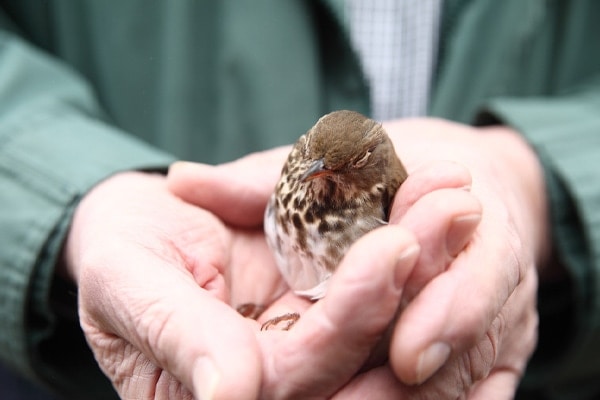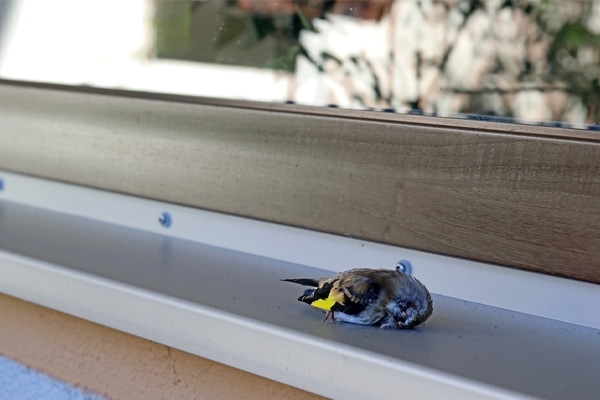Contents
Around one billion birds die because of window collisions every year. But the sad thing is that a certain percentage of those birds did not die immediately from the impact. They were just weakened, making them more vulnerable to predators.
Imagine yourself trying to enjoy a relaxing weekend early in the morning when you suddenly hear a loud thud on the window. You go out to check, only to see a beautiful bird lying on the ground, and you have no way to know if it’s alive or not.
If you’re feeding birds, you must know what to do in case you encounter this kind of scenario. After you hear that loud thud, you must be quick to check so you can remove that bird in harm’s way. But of course, how you do that is pretty important, too, as you might hurt the bird more.
In this article, I’m going to share a few things that will give you an idea of how to help a bird that flew into window. We’re going to tackle:
- What you should do and shouldn’t do when birds collide with a window
- Why birds hit the window
- How to prevent future window collisions
So, if these are things you’re interested to learn more about, read on…
When Birds Collide With A Window, You Should…
Find The Bird
The moment you hear a loud thud, run outside to see if it’s a bird. This is very important as you wouldn’t want any predators to see it or harm it.
I would also recommend preparing some things that might help you care for the bird better, especially if you often experience birds colliding with your windows. All you need is a dark container like a shoebox, a towel, and some gloves.
Place them in an area where you can grab them immediately when you hear a thud.
Observe The Bird Closely
Once you’ve found the bird, don’t do anything yet. Don’t pick it up or attend to it. Just watch it closely and check its behavior.
It usually takes a few minutes before the bird slowly recovers, especially for a minor hit. So, just observe and make sure that no predators can go near it. If you don’t see any reaction after five to six minutes, it’s time for you to take action.
Remember: You need to approach the bird very carefully. You don’t want the bird to get stressed, or it may injure itself even further.
Handle The Bird Correctly

If you’ve decided to approach the bird (to help bird that flew into window), wear your gloves and prepare your box. Place the soft towel inside the box and cut some tiny holes on the sides of the box to promote good airflow.
After that, carefully step close while making sure that you don’t scare the bird. Then, slowly pick the bird up and turn it right-side-up in your hand. This will allow the bird to breathe easily, compared to letting it lie down on its back.
Close your hands around it and gently place the bird on the box. Cover the box so that no light comes in. After that, bring the box inside your home. Make sure that you choose a warm and quiet area where nothing can disturb the bird from resting.
If you have pets or kids, keep them away and try your best to keep them quiet.
Give The Bird Recovery time
Once you’ve chosen a safe place, observe the box every 20 minutes to see if the bird is slowly recovering. It would usually take 2-3 hours for a bird, especially if stunned, to fully recover, so just be very patient here. Trust me, once the bird recovers, all your efforts will not go to waste.
Release The Bird
Once the bird fully recovers, take the box outside and release the bird.
Observe the area first to see if there are predators around. Even if the bird is recovered, it may not be fully healed yet, so they are easy prey. So, make sure that the area is really safe and with lots of shade they can rest into.
Also, it’s best if it’s away from windows and near places where it has plenty of food, water, and shelter.
Call Experts
When to call the experts?
There are four main instances when you should call an expert:
- If you’re not comfortable handling the bird on your own.
- If the injured bird is a raptor.
- If the bird is suffering from terrible visible injuries.
- If the bird doesn’t recover within two hours.
Each state may have a different organization to contact, so just check your Wildlife Rehabilitation Directory and find an expert that handles birds.
When Birds Collide Into A Window, YOU SHOULDN’T…
Offer Food or Water
When we see a weak person, the first thing that we would want to do is to give them food and water. However, birds are not like us. The only thing they will need is rest. You don’t want to stress them out by forcing them to eat or drink when it’s something that they don’t need at the moment.
Another reason for this is because each bird has a specific diet, and you shouldn’t assume what that is. This is even if you’re an experienced bird feeder familiar with what a particular bird species eat.
Your priority is to give the bird a quiet time at a safe place. Once they fully recover, they’ll be happy to eat on their own.
Give Medications
Aside from food, you should also not give medications to birds. Yes, it may sound like it’s something needed, but you might put the bird in more danger. Remember, some things we take as humans can be toxic to them.
If the bird is injured in any way, you can apply some first aid. For example, if the bird’s wings are broken, you can wrap that with something so the bird won’t move it as much. But if you’re not comfortable in doing first aid, call an expert for help.
Release The Bird Indoors
This is very important.
Releasing the bird in an unfamiliar place will startle the bird, and you might cause it to panic. When this happens, it will try to go anywhere to escape. But since you have limited space, it might end up colliding on a wall or a certain foundation in your home that can cause more harm to the bird.
With this said, you should not open the box fully when you’re checking the bird. If you do this, you might risk startling the bird and for the bird to escape.
Keep It As a Pet
Another important thing is to never keep the bird as a pet. Aside from the fact that it’s not allowed by the law, it will not benefit the bird in any way to stay inside your home.
You might think that they’re safer at your home, but it’s really not the best place for them. These creatures have been flying since birth, and they deserve to be free.
Handle Small Raptors
I’ve already warned you never to handle raptors. But, even in cases when a small raptor has flown into a window, you should still not touch it. These birds have sharp bills and talons that can injure you any time they choose to attack.
On top of that, if you mishandle these birds, it can significantly affect how they live and survive once they go back into the wild. So, just choose to call the experts, and while you wait for them, observe and keep the bird safe at its place.
Why Birds Hit The Window
One billion birds die from window collisions each year. But why does this happen so often? Why do birds collide into windows so often?
Well, this is mainly because for birds, windows are invisible. They don’t see reflection as we do nor understand what it is. These birds don’t know that what they’re seeing is just something behind them. For them, it’s like an open space that they can go through.
The worst thing is that this happens so often, whether it’s daytime or nighttime.
During the day, birds would see windows as open spaces. But during the night, nocturnal birds die because of lights coming from windows.
For some reason, these lights attract many birds and cause them to stray away from their path. This is very common when it’s foggy because the birds somehow see these lights as a guide.
Another reason why this happens is that birds attack the window when they see their reflection. For them, it’s another bird that is a threat to their territory, which is very common during the breeding season.
Fortunately, this is not a very huge threat as it’s mostly considered a minor collision. The bird can quickly recover from this, especially if you just follow the steps above.
Prevent Window Collisions
If birds fly into your window very frequently, this is already a sign that your window is definitely not bird-safe. So, you might need to change a few things to prevent window collisions from happening again.
Below are a few things that I would recommend:
Move Your Feeder
This is probably the most common advice that most bird watchers would recommend.
Usually, window collisions happen because your bird feeder is not too far from the window or too close to the window. What do I mean by this? The highly recommended bird feeder placement is greater than 10 feet away from the windows or less than 3 feet from the window. So, any distance within 3-10 feet is a no-no.
The reason behind this is if your bird feeder is less than 3 feet away from the window, even if the bird does collide with it, the impact wouldn’t be damaging. At the same time, if the bird feeder is greater than 10 feet away, the bird will be able to maneuver well after eating and wouldn’t collide with it.
But of course, this may not be very applicable to those who have limited space in their backyard. That’s why more things should be done, such as changing things up on your window to make it more bird-safe.
Change Things Outside
The first thing we can focus on is how you can change the outside look of the window.
Try to go outside of your home and view how your window appears. If you see trees and grasses reflected, then there’s a high chance that this is how a bird will see it, too. That’s why you need to put some markings on the outside surface of your window so that the bird knows that they should slow down or that the window is not an open area.
How do you do this? There are several ways:
- Use a Tempera Paint or Soap: These two don’t cost much and can last long, so it’s definitely worth the investment. All you need to do is draw some vertical lines (4 inches apart) and horizontal lines (2 inches apart) on your window. But if you’re feeling a bit artsy and don’t want to sacrifice your home’s aesthetics, you can also draw an artwork.
- Window stickers: If you don’t feel like drawing, window stickers can also do the trick. Try to get creative as much as you want, or maybe create a theme while you’re at it. But remember, you must put the stickers near each other, leaving no large space where birds might think they can go through. If you have a large window, fill that up if you can. You can’t put only two to three stickers there as it will only be useless.
- Tapes: If you don’t like to draw or use tickers, you can use any colored tape instead. Make a grid using the tapes on your window, and remember to use the correct spacing: vertical lines should be 4 inches apart, and horizontal lines should be 2 inches apart.
- Sunshades or awnings: Having a sunshade right above your window will help eliminate or minimize the reflection on your window.
- External Shutters: If you don’t like the idea of a sunshade, then external shutters might be for you. What’s nice about this is you can open and close it any time you want. You can open it if you want to quickly view something and close it again if it’s not in use. The only disadvantage of this is that it might prevent you from seeing the beautiful view outside, but I would say it’s worth it if it means keeping the bird safe.
- Acopian Bird Savers: Another name for this is Zen curtains. If you haven’t heard about this, it’s a curtain designed to really save birds. It has closely spaced horizontal ropes that you can hang down over your window, and this will serve as a marking for birds. What’s nice about this is that it’s very easy to install. On top of that, you don’t have to sacrifice aesthetics by using this kind of curtain.
- Mosquito Screens: Next, you can also install screens over your window. Mosquito screens have very tiny gaps, which will surely make any bird stop once they see it. Just make sure that the whole window is perfectly covered.
- Netting: If you don’t want to place anything on your window, you can also put a net at least 3 inches away from your window. Make sure that you use a small mesh so that even a hummingbird won’t be able to go through. By putting a net, no bird will surely get hurt. Because even if they don’t see the lines from the net, it will still bounce them off from danger.
- Whitewash: Some people also whitewash their windows to prevent any reflection. Although this may sound like a good idea, it’s not a long-term solution. The product you use will eventually wear off, and you will have to do the whole process again. However, it’s something you can do if you’re looking for a temporary solution while you decide on what you can do to your windows.
Change Things Inside
Aside from changing things up from the outside, the inside of your home is also very important. You see, apart from seeing the reflection outdoors, birds might also see some things inside. So, if you have plants or anything there, birds will most likely think of it as a perching area.
So, here are some things that you can do to prevent that from happening:
- Remove plants from the window: As mentioned above, birds might mistake these plants as perching areas, prompting them to fly fast and hit the window. So, if you have any plants there, remove it, especially if you haven’t installed any bird-proofing materials outside.
- Vertical blinds: We’ve talked about shutters outside your windows. If you don’t like that idea, then you can also install some vertical blinds. If you need it open, make sure that you only open it halfway.
- Curtains: Again, if you’re really not looking through anything outside, close the curtains and keep the birds safe.
- Turn off lights: At night, be sure to turn the lights off. This way, you wouldn’t catch the attention of nocturnal birds or migratory birds that mainly travel at night.
- Install a one-way transparent film: If you love watching outside your window as much as I do, then a one-way transparent film might be the best thing you can use. This film will allow you to see everything outside, but nobody can see what’s inside. Make sure that you choose a film that would make the window appear opaque outside to prevent any reflection.
Always Think Bird-Safe
If you’re planning to renovate your home, you can consider some bird-safe window options:
- Fritted-glass windows: What I love about frit-glass windows is that they’re designed to keep birds safe. The glass has closely spaced dots that make the glass clearly visible from the outside. Birds would be able to see it immediately and fly away from it.
- Angled glass: If you don’t want to buy a new window, you can instead change the angle of your glass so that it faces downward. This will prevent any kind of reflection from your surroundings.
- UV-reflective glass: This is another glass made for birds. Birds can see this glass clearly, while for us, it just looks like ordinary transparent glass.
- Etching or Sandblasting: If you don’t like to have plain windows, then you can use etched or sandblasted glasses. These glasses will allow you to get as creative as you can. So, if you want to keep the aesthetics of your home, this might be a great investment for you.
Final Thoughts About How To Help Bird That Flew into Window
As bird watchers, it’s also our responsibility to make sure that our wild birds are safe. Of course, terrible accidents can always happen to birds, and that’s why you must always be prepared.
If you hear a thud, make sure to run out immediately to check. And if it’s a bird, remember these things:
- Just stay put, observe, and wait 5-6 minutes for the bird to recover. Keep it safe from predators.
- If the bird doesn’t recover after 5-6 minutes, place it inside a container so it can relax.
- Wait 2-3 hours for the bird to fully recover and release it back outside.
- Know when to call professionals for help, especially if it’s a raptor or a seriously injured bird.
You might not have experienced this yet, but if you do, just stay calm and keep these things in mind. And to make sure that this will not happen, follow the tips above on preventing birds from flying into a window.

